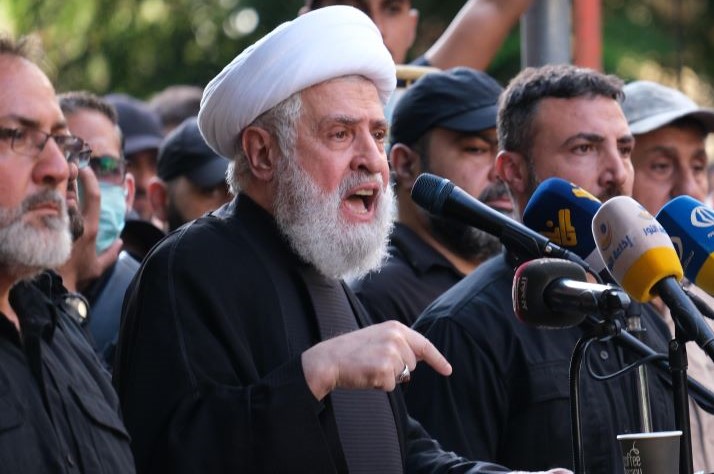Stepping out of Nasrallah's shadow

It comes as little surprise that the man with the white turban and grey beard was appointed the new Secretary General of Hezbollah on Tuesday. Naim Qassem has been one of Hezbollah’s public faces for decades and leads its political arm in the Lebanese parliament in Beirut. Above all, Qassem stands for continuity.
The 71-year-old has been acting as Hezbollah's head for over a month, after his predecessor, Hassan Nasrallah, was killed in a massive Israeli attack in southern Beirut on 27 September.
Qassem was Nasrallah's long-standing deputy and, according to the organisation's statutes, he was to remain in this provisional office until a new leader was chosen.
After Nasrallah's death, it was widely expected that his cousin Hashem Safieddin would take over the role. A few days later, however, he too was killed in an Israeli attack. So the job fell to Qassem as acting leader.

Infiltrated but strategically undefeated
Hezbollah may have been infiltrated by Israel, but it is far from defeated. Its most powerful missiles are yet to be deployed. To prevent the situation from spiralling completely out of control, look to Gaza.
Contact person for Western media
Like Nasrallah, Qassem is one of the organisation's veterans and one of its co-founders back in 1982. As early as 1991, when Abbas al-Mussawi, who was later killed in an Israeli air raid, took over the office of Secretary General, Qassem was appointed Deputy Chief–a post he retained under Nasrallah and held for a total of 33 years. In this sense, Qassem is a constant in Hezbollah.
But while Nasrallah, for security reasons, has only appeared in public via video screen since the 2006 Lebanon war, Qassem was for many years the public face of Hezbollah. He has served as a kind of faction leader of Hezbollah since 1992 when the organisation ran for the first time in a parliamentary election. It has, ever since, remained one of the strongest parties, ruling with a variety of coalition partners in the Lebanese parliament in Beirut.
In this role, Qassem has often given interviews to Western media and news agencies, most recently to the US news agency AP on 3 July of this year. That interview took place before the most recent escalation between Hezbollah and Israel in September, but after the outbreak of fighting in southern Lebanon and northern Israel which began on 8 October 2023.
The conversation with AP took place in one of Hezbollah's political offices in southern Beirut, a building which has since been destroyed. At the time, Qassem said that a ceasefire on the Israeli-Lebanese border would only be possible if the weapons in the Gaza Strip also fell silent.
Since Nasrallah's death, Qassem has appeared in public three more times, but only via video. The last time he stated that he supported the Lebanese government's ceasefire negotiations, without explicitly talking about a ceasefire in Gaza.
At the same time, Qassem was defiant and declared that the war between Hezbollah and Israel was also about "who cries first, and that will not be Hezbollah." He also stressed that his organisation's military capabilities were intact and could inflict "painful blows" on Israel.
Growing up in the Amal Movement
Qassem, who was born in Beirut in 1953 and has six children, originally studied chemistry and French at the Lebanese University in the capital. He became politically active in 1974 in the Shiite Amal movement, which was founded that year. He left the movement after the 1979 revolution in Iran. He continued his Shiite seminary studies and began preaching in several mosques in southern Beirut.
When Hezbollah was founded in 1982, he was one of the founding members of the new organisation, which was primarily opposed to the Israeli occupation of southern Lebanon. He rose through the ranks to become Deputy Secretary General in 1991. He never achieved Nasrallah's public charisma and always remained in his shadow.
The Israeli government paints a picture of Qassem as a man whose death sentence has already been sealed. The Israeli government's Arabic X account states: "His term in office could be the shortest in the history of the terrorist organisation if he follows the fate of his predecessors Hassan Nasrallah and Hashem Safieddin."
© Qantara.de 2024
